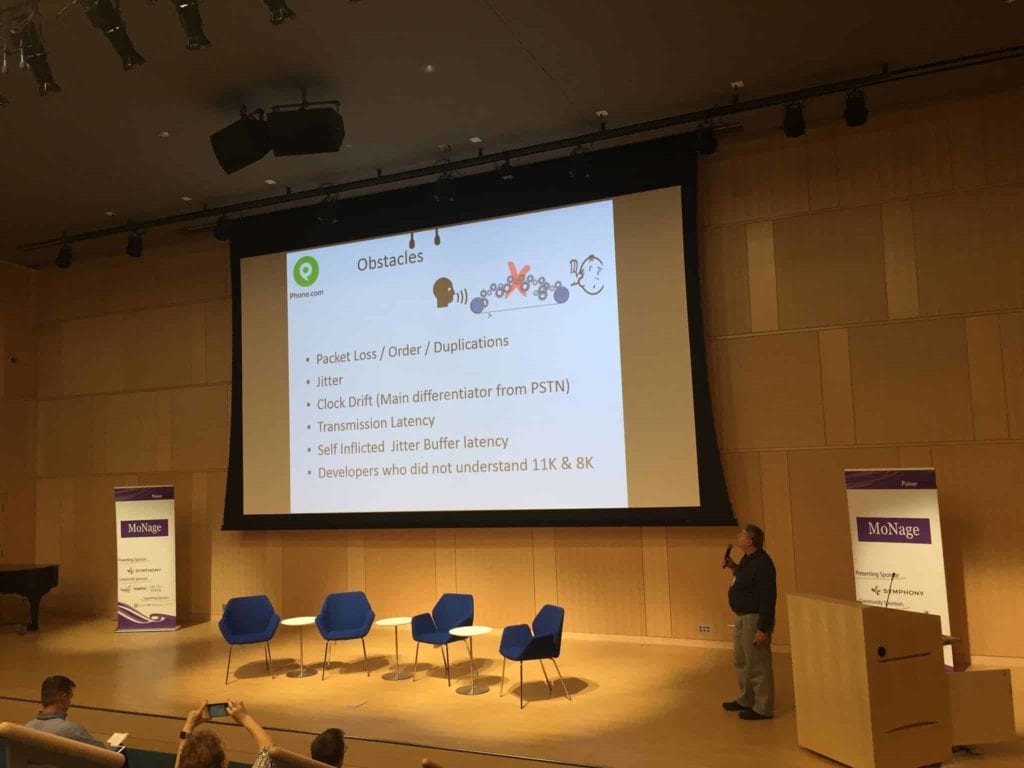Phone.com CTO and Executive Vice President Alon Cohen recently presented on the history of VoIP at the MoNage conference hosted by Jeff Pulver.
Alon Cohen recently presented on the history of VoIP at the MoNage conference hosted by Jeff Pulver.
Pulver and Cohen have a long history together, highlighted by the fact that together they were the first entrants voted into the VoIP Hall of Fame. For those in the know, Cohen is really the only option for this kind of presentation. Without Cohen and his groundbreaking work at an Israeli startup named VocalTec, there might not be any commercial VoIP today.
VocalTec faced many obstacles on the road to VoIP, and if not for a major pivot it might never have been at all. Cohen originally co-founded VocalTec with Lior Haramaty to make sound cards and voice-related applications for PCs, but they woke up one morning to the news that Creative Labs, the team behind the SoundBlaster sound cards, had secured huge funding, massive U.S. marketing, and Far East manufacturing deals.
This was 1993, and Cohen and VocalTec had a choice to make. They went to the white board to put the pieces of a puzzle together.
- What are we good at?
- Software development, audio processing, and telecom
- What will happen in the future?
- Every computer will have voice features
- What is a large market we can disrupt with this information?
- Telecom
Out of that discussion, VocalTec pivoted to build a phone system over a computer network.
Sounds easy, right? Well, the truth was far from it. Obstacles were plentiful and daunting, including packet loss, transmission latency, low CPU power, no real-time audio compression, and, of course, the lack of Internet penetration.
Cohen and the VocalTec team went straight to work on four key solutions:
- Very fast sample rate conversion.
- Efficient and effective real-time compression to enable sampled audio to pass through 14.4Kbps Modem.
- A process for dynamically adjusting the jitter buffer size according to network conditions to reduce latency.
- A solution for dynamic IP address resolution.
The last solution proved to be one of the trickiest. In the dial-up days, IP addresses (what would be considered the VoIP “phone number”) were dynamic and you would get a new one every time you dialed-up the internet. DNS was too slow and could take up to three days to update. The solution was to register all clients to the IRC network, allowing other clients to extract the IP address.
It worked, and an industry was born! On Feb. 13, 1995, the iPhone (Internet Phone) software launched. Soon competitors started to emerge, and all signs pointed to growth … until the universities that hosted the IRC servers decided to shut off iPhone access.
How did VocalTec overcome that crushing blow? Pulver stepped up and opened a private IRC server at his home, so the service could continue until VocalTec built its own IRC network.
The rest, as they so often say, is history. VocalTec went on to become one of the first successful Internet IPOs and VoIP became the cloud telephone solution challenging the telecom infrastructure.

